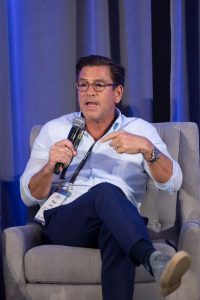Above, Realty ONE Group General Counsel Alex Mihai. Photo by AJ Canaria.
Nothing stays the same in business. Or more to the point, nothing should stay the same, especially in the real estate industry, where sales numbers can be spectacular one year, then plummet the next. In such a constantly shifting environment, it is crucial that brokerage owners learn from the past to project for the future, even while being beyond busy with the present.
In the first of two discussions at RISMedia’s recent CEO & Leadership Exchange in Washington, D.C., real estate leaders, in a session titled “Shaking Up Your Business Model: How to Stay Current as the Industry Evolves,” an eclectic group of progressive brokers shared how they’ve shaped their business models for modern times.
Next, in the “Must-Know Marketing Strategies to Attract Agents” session, brokerage CMOs provided an inside look into their marketing strategies for recruiting and retaining the best agents.
Leading off the conversation moderated by Realty ONE Group General Counsel Alex Mihai, Shaking Up Your Business Model focused on the evolving real estate industry and how businesses can adapt to stay current.
While the need for better leadership and professionalism within the industry was a common theme throughout, Thad Wong—co-CEO of @properties Christie’s International Real Estate—kicked things off by discussing how his company has adapted its business model to provide more value to agents.
“We definitely shook up our business model a bit, and I would argue that we did our best work during the downturn,” said Wong, pointing to the acquisition of Christie’s International Real Estate just eight to 10 months prior to the market slowdown.
With the added responsibility for 50 other companies in the country and also overseas, but primarily in North America, Wong and his leadership team doubled down on gaining control of their share of the market.
“When agents are suffering, when they’re selling less real estate and they’re with your company, you have a responsibility to provide them with resources, ideas and tools in order for them to capture marketshare,” he explained.
“I think we’re having significantly more impact than we would have if we were solely focused on Chicago because the added revenue allows us to invest more into tech, marketing, training, coaching and culture,” he added.
With approximately 1,300 agents spread across 39 states, Chad Ruggles—SVP of Vylla Home—emphasized the importance of clear brand messaging.
“For us, it’s all about being okay with who we are,” said Ruggles. “To that end, we focus on the value we can give to the agent with the scale that we’ve got and the partnerships we have.”
Lead generation has been the name of the game, although not in the traditional sense of paying for leads and bringing them to the website, but rather, finding strategic partners.
“Agents don’t join us for our brand name, but when they do get here, we’ve got to show them great culture, leadership and support. But it’s got to be more than that since everybody in the room has that, so hopefully what makes us different is the fact that we can hand you real business.”
Next, Claudia Stallings—chief operating officer/partner at Wallace Real Estate—shared her experience transitioning from a national franchisor to an independent company.
“We’re in a very heavily franchised market, and we needed to find our differentiator, but we didn’t want to fundamentally change who we were, what we offered, our culture or any of those things,” explained Stallings.
After looking at the market, themselves, their offerings and value proposition, Stallings and her three business partners decided that it was time to fill the gaping hole in their market and branch out on their own.
“As a leader in our industry, you owe it to yourself to keep your eye on what is out there as a possibility,” added Stallings, who likened the experience of timing the transition just right to jumping out of a plane.
“While I’ve never jumped out of a plane, I imagine the experience is very much the same as taking this leap and cutting the cord. You have to know when to jump, but you can’t jump too soon—and if you wait too long, you won’t land in the right spot.”
Staying ahead of the curve: proactively preparing for potential changes
Facing a plethora of challenges as an industry, James Dwiggns—CEO of NextHome, Inc.—highlighted the need for proactive preparation for potential changes in the industry, specifically compensation structures.
“This industry is going to evolve a lot,” noted Dwiggins, who posed the following thought-provoking questions:
-What if compensation in the MLS doesn’t exist any further?
-How are agents trained to talk to a buyer to have them pay them that compensation directly?
-How do we retrain our people to understand a different world?
For Dwiggins, a proactive approach is key as the legal battles challenging the agent commission structure unfold, with Anywhere Real Estate and RE/MAX settling two major class action lawsuits last month—revealing the full terms of their settlements as well.
“We’re training our people now for a reality that is likely going to happen, whether it’s through these class action cases or whether we’re dealing with the Federal Trade Commission who wants to make changes to compensation structure as it is,” said Dwiggins.
“We’re going to have to evolve as an industry,” he added. “It’s not going to look the same in 24 months. We don’t know what that’s going to be, but as leaders, we have to start taking a proactive approach.”
Dwiggins continued, pointing to developing better leaders in the industry as the biggest thing that needs to be done today.
“The things that are happening will make this industry more professional long term,” said Dwiggins. “The people that are good at what they do are going to rise to the top. They’re going to build great brands like everybody here, and it’s going to become a more professional industry.”
“We need to raise the level of leadership across the board,” concurred Joe Skousen, CEO of Inside Real Estate, who emphasized the importance of staying ahead of the curve.
“As a technology company, we’re getting with our marketing team and saying, ‘hey, let’s go make videos that anyone can brand to themselves and hand to their agents and get the buyer broker agreement in the presentation solution,’” said Skousen, who encouraged the audience to lean in rather than waiting to see how things shake out.
As the needs of today’s agents and consumers continue to evolve, adapting to meet the demands of changing times is mission critical.
“When we talk about staying current, you have to evolve. You can’t wait,” reiterated Skousen. “You have to evolve your value proposition.”
And for Skousen, it’s more than just selling somebody a tech solution.
“Our job is to make sure you’re more productive today than you were yesterday—and part of what we have to think about is how we offer new value,” he added.
“One of the games today as a brokerage is rethinking what your value proposition is. Because the dollars—if you think about that as your TAM (your total addressable market)—the TAM dollars are being spent. You’re just not getting them.”
Marketing strategies to attract agents
In the second session, moderator Amit Kulkarni, chief marketing officer for Bright MLS, led the panelists as they focused on strategies for growing a real estate business, specifically through recruiting new agents and retaining existing ones. There was an emphasis on the importance of understanding the company’s brand and vision to attract the right fit.
“You’ve already cut expenses and done all the things you can to shore up the costs,” began Kulkarni. “The only way to get bigger now is to grow, recruit new agents and retain existing ones. How do you set that vision for who you are as a company and apply that so you can attract the right fit for your brand?”
Allan Dalton, senior VP of research & development for Berkshire Hathaway HomeServices and HomeServices of America, began with a tongue-in-cheek comparison before turning serious about recruiting.
“Is there any other industry that talks about recruiting as much as we do other than the military?” he said. “And is there anybody who uses the word ‘retention’ as much as those referring to prisons do?
“So how do we actually become more persuasive? There’s three basic ways. One is ethos, one is pathos and the third is logos. Ethos is the brand. People come to Berkshire because of the brand. That matters, but we have to have value beyond the brand. And that goes all the way down to logos, which is the math. We’ve been seeing companies without venerated brands that have been very successful and attracting people based on the math, based on compensation plans, because to a lot of people, it’s not just about the brand, it’s about a business model. It’s not about the culture, it’s about the compensation program.”
Cory Vasquez, chief marketing officer for Realty ONE Group, explained that her company is embarking on a campaign to get more visibility in order to attract new talent.
“We’re in brand-build mode,” she said. “We want agents to get to know us, and we’re having conversations whether they’re digital or social or through drip campaigns on behalf of our offices and our agents, even to the buyer/seller point. We connect with agents and find the right ones that make the right relationship, because not every agent should be with us necessarily.”
Kulkari next turned to Rajeev Sajja, SVP, digital marketing and innovation for Berkshire Hathaway HomeServices Fox & Roach, REALTORS® and The Trident Group, asking him to share how to identify the agents who may leave the brokerage, and retain the ones needed to help drive the business forward.

Rajeev Sajja, SVP, digital marketing and innovation, Berkshire Hathaway HomeServices Fox & Roach, REALTORS® and The Trident Group. Photo by AJ Canaria.
“We’ve done a value proposition, which is really important to identify who is the right fit in terms of agents,” said Sajja. “For us it’s culture, innovation, growth and the brand. We have a quarterly mindset of meeting all our key producers, and that’s how we proactively give them a business plan. We want to have forever agents.”
The usage of technology and data to identify potential recruits and at-risk agents was another topic parsed at the session.
Acknowledging that there’s a lot of technology out there and a lot of different things brokers can use to help with recruiting and retention efforts, Amory Wooden, CMO of CENTURY 21®, Better Homes and Gardens® Real Estate and ERA®, shared what her company is doing as a corporation and for the franchises and brands.
“What’s critical in the world of recruiting is the combination of brand uniqueness and technology,” she said. I’m fortunate to lead marketing for three global brands. And our job as a marketing team is to spotlight the super-power of each of those brands. That’s what you need to do to attract great talent, to attract great agents. We want to make sure we have automated systems that make it easy, make it turnkey.
“We’re taking topics and feeding them into a ChatGPT-like engine to push content that is attracting people to our company. We would not be able to do that with minimal labor.”
For additional CEO & Leadership Exchange coverage, don’t miss:
Sue Yannaccone Predicts Industry-Wide Shakeup in RISMedia CEO Exchange Keynote
Real Estate Leaders Discuss Prominent Industry Threats at RISMedia’s CEO & Leadership Exchange
U.S. Senator Cynthia Lummis Urges Real Estate ‘Activism’ at RISMedia CEO & Leadership Exchange
Economists Predict Longer-Term Housing Rally at RISMedia CEO & Leadership Exchange
Growth, Competition and Profit: Is the Listing Portal Pace Sustainable?
MLS Leaders Call for a ‘Move Away’ From NAR Amidst Legal Woes
Strategies for Navigating the Current Market: Adapting to Changes and Focusing on Growth
AI ‘Not a Spectator Sport,’ Real Estate Leaders Assert
Changing With the Times: How Real Estate Winners Are Staying That Way







